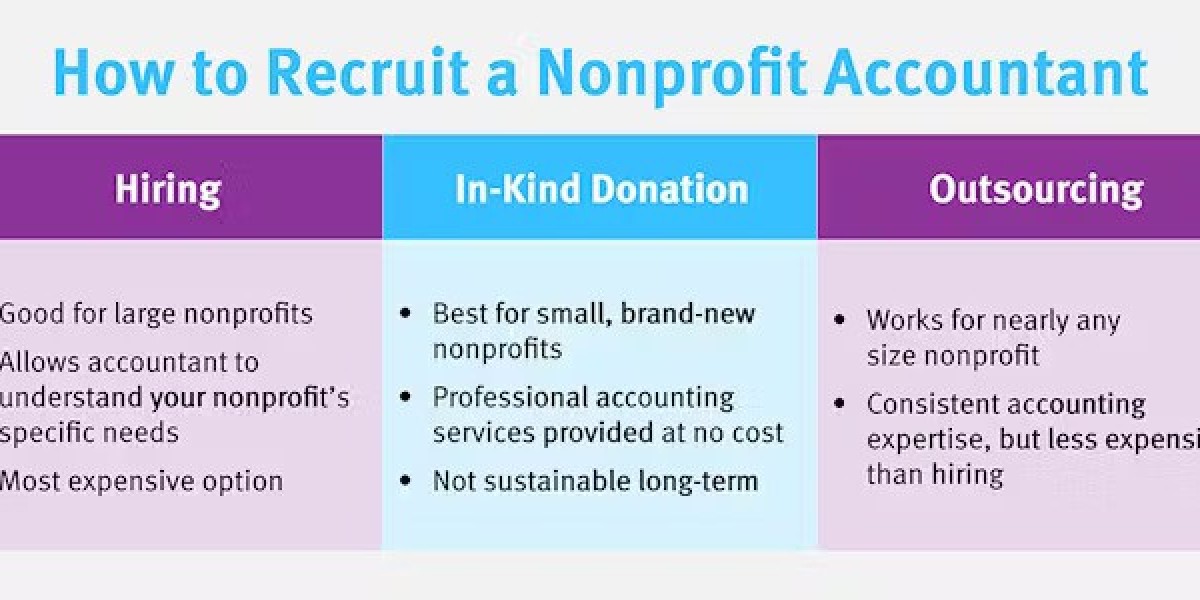Running a nonprofit is no small task. Between managing programs, engaging donors, applying for grants, and ensuring compliance, many nonprofit leaders find themselves overwhelmed—especially when it comes to keeping the books accurate and up to date. Bookkeeping might not be glamorous, but it’s critical to your organization’s credibility, sustainability, and overall success.
That’s why more organizations are turning to outsourced bookkeeping for nonprofits. By delegating this essential financial function to professionals, nonprofits can streamline operations, improve accuracy, reduce overhead, and ultimately focus more energy on their mission.
In this article, we’ll explore why outsourced bookkeeping is not just a cost-saving strategy—but a smart financial move for modern nonprofits.
What Is Outsourced Bookkeeping for Nonprofits?
Outsourced bookkeeping for nonprofits refers to hiring an external accounting service or firm to handle your organization’s day-to-day financial transactions, such as:
Recording donations, grants, and expenses
Reconciling bank accounts
Managing payroll and vendor payments
Tracking restricted vs. unrestricted funds
Generating financial reports and statements
Preparing for audits or board reviews
Rather than hiring an in-house bookkeeper (or burdening existing staff), nonprofits can access experienced professionals who specialize in nonprofit financial compliance and reporting—often at a lower overall cost.
1. Nonprofits Have Unique Financial Needs
Unlike for-profit businesses, nonprofits must follow specific financial rules, including:
Fund accounting (restricted vs. unrestricted funds)
Grant tracking and reporting
IRS Form 990 filing
Donor reporting and gift acknowledgments
Audit readiness
A general bookkeeper may not be familiar with these nuances. However, outsourced providers that specialize in nonprofit accounting understand these complexities and help ensure full compliance with IRS, grantor, and board expectations.
By outsourcing to experts in nonprofit bookkeeping, your organization minimizes errors, avoids compliance risks, and builds credibility with donors, board members, and regulators.
2. Cost Savings Without Compromising Quality
Hiring an in-house bookkeeper includes not just salary, but also expenses such as:
Payroll taxes
Benefits
Office equipment and space
Ongoing training
Management time
Outsourced bookkeeping eliminates many of these costs. Most firms offer flexible pricing—hourly, monthly retainers, or service bundles—allowing nonprofits to pay only for the services they actually use.
This makes outsourced bookkeeping for nonprofits especially valuable for smaller organizations or those operating with lean administrative budgets. It also reduces the risk of turnover or relying on a single staff member to manage all financial records.
3. Access to Nonprofit Financial Expertise
When you outsource bookkeeping, you gain access to a team of professionals who stay up to date with nonprofit accounting regulations, GAAP standards, and best practices. Many outsourced providers also offer controller or CFO-level advisory services—giving you deeper insight into your financial health, forecasts, and funding strategies.
This level of financial guidance can help your organization:
Prepare for audits and reviews
Manage cash flow and budgets more effectively
Understand key financial ratios and KPIs
Make data-driven decisions
Rather than hiring one in-house person with limited capacity, you gain an entire team with diverse knowledge and experience in nonprofit finance.
4. Increased Accuracy and Timeliness
Outsourced bookkeeping providers operate under strict service-level agreements and review processes, ensuring that:
Transactions are recorded promptly and accurately
Reconciliations are done on schedule
Reports are generated in time for board meetings, grant submissions, or compliance deadlines
This consistent, timely bookkeeping builds financial confidence among leadership, donors, and auditors. It also reduces the chances of misreporting or delays that could harm your reputation or funding eligibility.
5. Improved Transparency and Donor Confidence
Donors, grantmakers, and stakeholders expect transparency. They want to know that your nonprofit is managing funds responsibly and effectively.
With clean, professional financial records—backed by an expert bookkeeping team—you can confidently share:
Clear financial statements
Program-specific reporting
Grant spend-downs
Fundraising performance
Professional outsourced bookkeeping not only ensures this data is accurate but also presents it in a way that builds trust and supports your development efforts.
6. Audit-Ready at All Times
Annual audits or financial reviews can be stressful—especially if your books aren’t in order. Outsourced bookkeepers understand audit preparation and ensure all documentation, reconciliations, and supporting records are complete and organized throughout the year.
This leads to:
Smoother audits with fewer adjustments
Reduced audit costs
Greater confidence from your board and donors
Being “audit-ready” at all times is one of the biggest long-term advantages of outsourced bookkeeping for nonprofits.
7. More Time to Focus on Your Mission
Ultimately, your organization exists to make a difference—not to get buried in spreadsheets and reconciliations.
When you outsource your bookkeeping:
You spend less time on routine financial tasks
You reduce stress during tax season and audits
Your team can focus on fundraising, programs, and impact
This alignment between mission and operations is key to scaling your efforts and increasing your impact.
8. Scalability as You Grow
As your nonprofit grows, so do your bookkeeping needs. More donors, grants, staff, and programs mean more financial complexity.
Outsourced bookkeeping services are highly scalable. They can adapt to your changing needs—whether that means handling more volume, offering more detailed reporting, or integrating with donor and grant management systems.
You won’t need to hire new staff or overhaul internal systems every time you expand—your outsourced team can grow with you.
Final Thoughts
Outsourced bookkeeping for nonprofits is more than a cost-cutting measure—it’s a strategic investment in your organization’s long-term financial health and sustainability.
With expert support, you can stay compliant, impress donors, streamline operations, and focus your energy on what matters most: your mission.
Whether you're a small nonprofit trying to stretch limited resources or a growing organization needing better systems and oversight, outsourcing your bookkeeping is a smart, scalable, and financially sound decision.






